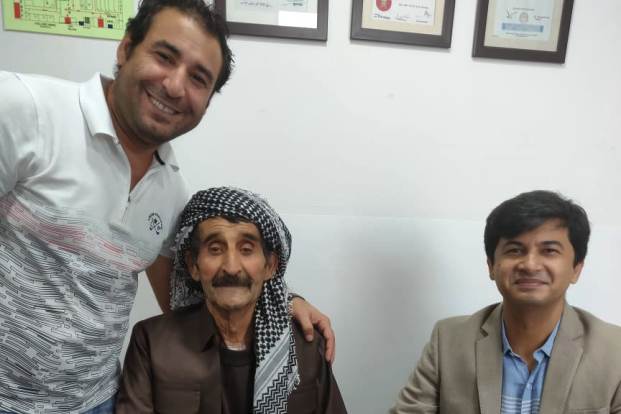Apr 25, 2022
67 yr old chronic smoker from Iraq treated for Breathlessness and Palpitations with Aortic Valve Replacement Surgery at Paras Hospitals, Gurgaon

Doctors at Paras Hospitals, Gurgaon successfully performed an Aortic Valve Replacement on a 67 yr old chronic smoker from Iraq suffering from breathlessness on minimal exertion, palpitations with anxiety and mild chest pain. The patient was experiencing the signs and symptoms for the last 3 years.

On consulting few doctors in Iraq, Mr. Ramadhan Mawlood Karsoo, was recommended to opt for specialized care in India. On close consultation with family and friends, Mr Karsoo, decided to consult Dr Mahesh Wadhwani at Paras Hospitals, Gurgaon.
Dr Wadhwani is an exemplary surgeon, credited to be part of more than 6000 major heart surgeries over the last 11 years.He trained at Sree Chitra Tirunal Institute for Medical Sciences and Technology, Trivandrum, which is the most premier institute in the field of Cardiothoracic and Vascular Surgery in India. He specializes in pediatric cardiac surgery, Beating Heart CABG, Total arterial Revascularization (TAROPCAB), Valve Replacement/ Valve Repair, Congenital Surgery/Congenital Defects, Atrial Septal Defect(ASD), Ventricular Septal Defect(VSD), Tetralogy of Fallot in Children (TOF), Patent Ductus Arteriosus (PDA), to list a few.
Dr Mahesh Wadhwani, during the OPD, recommended few tests for cardiac evaluation, which revealed that the due to persistent and chronic smoking, the patient was suffering from Aortic Stenosis.
Dr Mahesh shares, “Aortic valve stenosis occurs when the heart’s aortic valve narrows. This narrowing prevents the valve from opening fully, which reduces or blocks blood flow from your heart into the main artery to your body (aorta) and onward to the rest of your body. When the blood flow through the aortic valve is reduced or blocked, your heart needs to work harder to pump blood to your body. Eventually, this extra work limits the amount of blood it can pump, and this can cause symptoms as well as possibly weaken your heart muscle. Your treatment depends on the severity of your condition. You may need surgery to repair or replace the valve. Left untreated, aortic valve stenosis can lead to serious heart problems. Aortic valve stenosis ranges from mild to severe. Aortic valve stenosis signs and symptoms generally develop when narrowing of the valve is severe. Some people with aortic valve stenosis may not experience symptoms for many years.
Dr Mahesh further states, “ The signs and symptoms of aortic valve stenosis may include: Abnormal heart sound (heart murmur) heard through a stethoscope, Chest pain (angina) or tightness with activity, Feeling faint or dizzy or fainting with activity, Shortness of breath, especially when you have been active, Fatigue, especially during times of increased activity, Heart palpitations — sensations of a rapid, fluttering heartbeat, Not eating enough (mainly in children with aortic valve stenosis), Not gaining enough weight (mainly in children with aortic valve stenosis.”
Mr Karsoo had all the signs and symptoms stated above and the cardiac evaluations also supported aortic stenosis. Hence aortic valve surgery was planned for the patient and post 4 days the patient was fit to be discharged.
Dr Mahesh states,” It is a myth that cardiac surgery puts the patient’s life at risk. In numerous cases it is the best line of treatment. Hence before deciding on your treatment plan, it is best that you consult both – an interventional cardiologist and a cardiac surgeon.”

